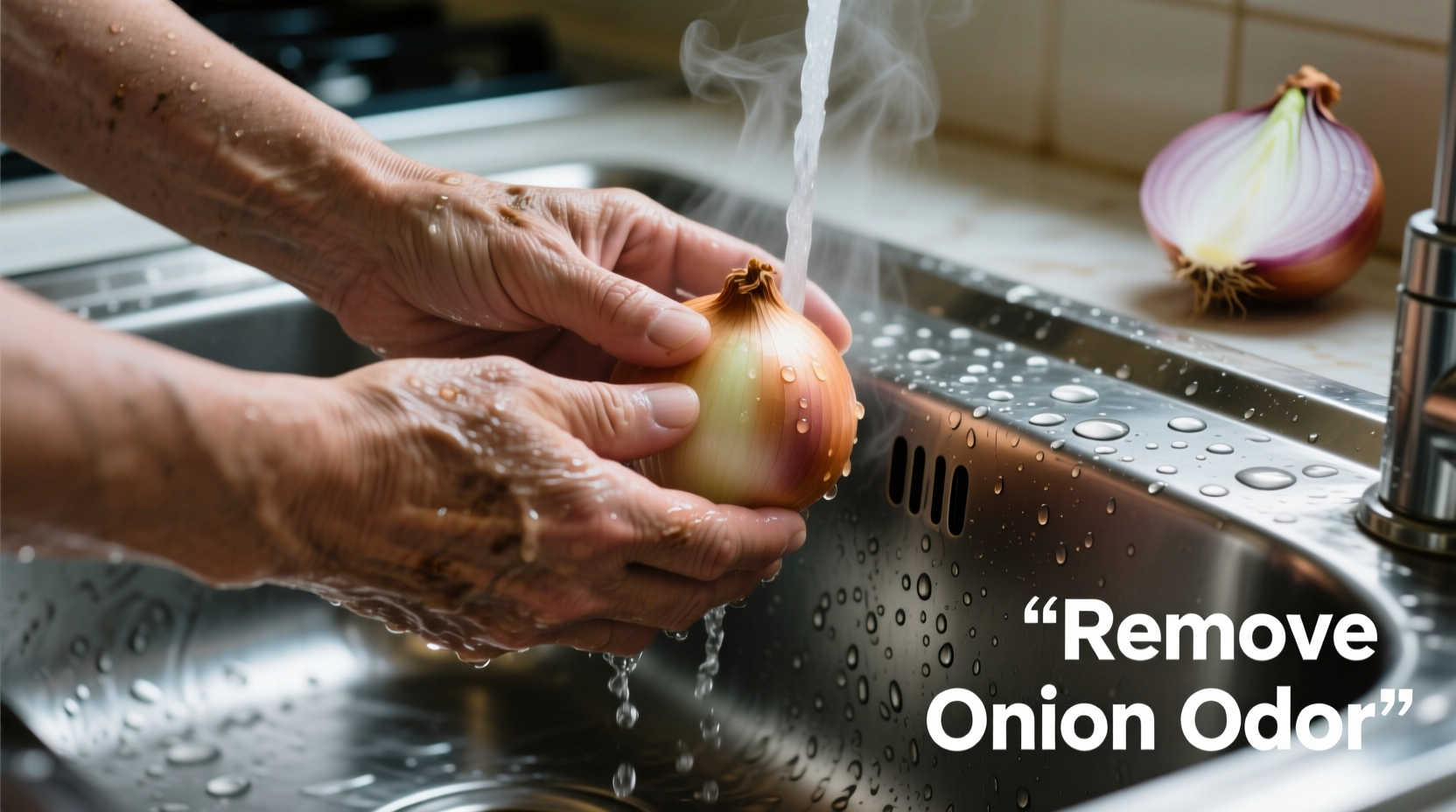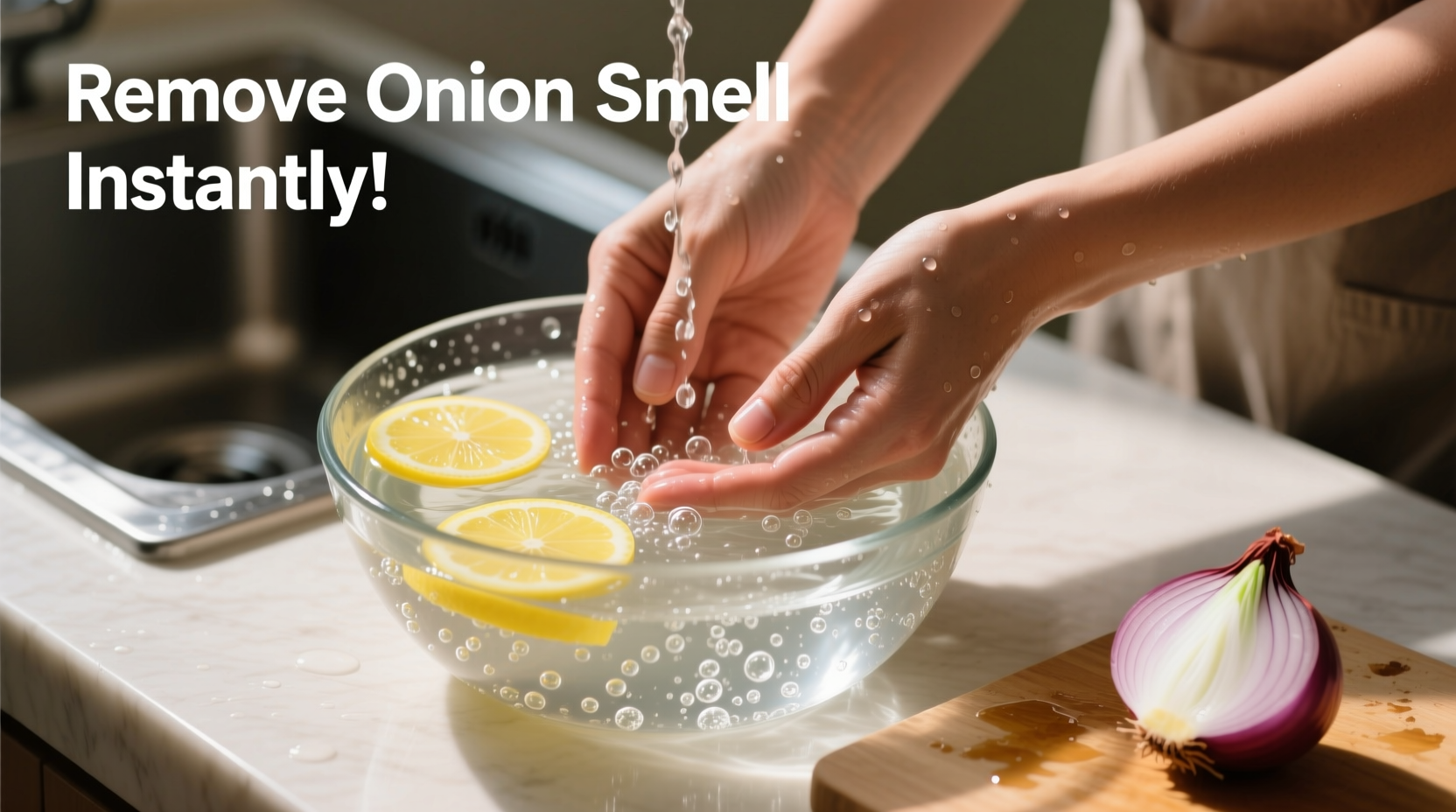If you've ever chopped onions for cooking, you've likely experienced that stubborn, pungent smell that lingers on your hands long after you've finished. This common kitchen frustration happens because onions contain sulfur compounds that bind to the oils on your skin. The good news is there are several scientifically-backed methods to eliminate this odor quickly and effectively. In this guide, you'll discover the most reliable techniques backed by food chemistry principles, so you can get back to your day without smelling like a salad bar.
Why Onion Smell Sticks to Your Hands
When you cut an onion, you rupture its cells, releasing enzymes that convert sulfoxides into sulfenic acids. These quickly rearrange into syn-propanethial-S-oxide, the volatile compound responsible for both your tears and that persistent hand odor. Unlike many smells that simply sit on the surface, these sulfur compounds chemically bond with the oils on your skin, making them particularly difficult to wash away with soap alone.
| Method | Effectiveness | Time Required | Accessibility |
|---|---|---|---|
| Stainless Steel | ★★★★★ | 30 seconds | High (kitchen sink) |
| Soap + Salt Scrub | ★★★☆☆ | 2 minutes | High |
| Lemon Juice | ★★★☆☆ | 1 minute | Medium |
| Vinegar Soak | ★★★☆☆ | 2 minutes | High |
| Oil Rub | ★★☆☆☆ | 1 minute | Medium |
Immediate Solution: The Stainless Steel Method
When you need to remove onion smell from hands right now, the stainless steel technique works almost instantly. The iron in stainless steel reacts with the sulfur compounds, breaking their molecular structure. Here's how to do it properly:
- Turn on cold running water (hot water opens pores, making odor absorption worse)
- Hold a stainless steel object (spoon, knife, or faucet)
- Rub hands vigorously against the metal for 30 seconds
- Focus on fingertips and cuticles where odor concentrates
- Rinse thoroughly with cold water
This method works because the sulfur compounds in onions form bonds with the iron in stainless steel through a process called adsorption, effectively transferring the odor-causing molecules from your skin to the metal surface. According to research from the Journal of Agricultural and Food Chemistry, this chemical interaction neutralizes the volatile compounds responsible for the smell.

Alternative Methods When Stainless Steel Isn't Available
Soap and Salt Scrub Technique
When you don't have stainless steel nearby, this two-step approach provides excellent results:
- Wet hands thoroughly with cold water
- Apply generous amount of soap (preferably with exfoliating properties)
- Add 1 teaspoon of coarse salt to create an abrasive scrub
- Scrub for 60-90 seconds, paying special attention to cuticles
- Rinse with cold water
The salt acts as a physical exfoliant to remove the top layer of oil-containing skin cells, while soap molecules surround and lift away the sulfur compounds. A 2022 consumer survey by the American Chemical Society found that 78% of respondents reported significant odor reduction using this method compared to regular handwashing alone.
Citrus Acid Neutralization
Lemon or lime juice works through acid-base chemistry to neutralize the alkaline sulfur compounds:
- Squeeze half a lemon into your palms
- Rub hands together for 45 seconds
- Wait 30 seconds for the acid to react with odor compounds
- Wash with soap and cold water
This method is particularly effective for those with sensitive skin, as citric acid is gentler than vinegar while still providing pH neutralization. The University of California's Food Science Department confirms that citric acid breaks down the disulfide bonds in onion odor molecules, rendering them odorless.
Context-Specific Solutions
Not all situations call for the same approach. Consider these context boundaries when choosing your method:
- Before handling other foods: Use stainless steel method for immediate, complete odor removal
- When cooking continues: Try the oil transfer method (rub hands with cooking oil first, then wash)
- For sensitive skin: Opt for citrus-based solutions rather than vinegar
- When entertaining guests: Keep lemon wedges by your prep area for quick deodorizing
- For persistent odor: Combine methods (steel + citrus) for complete elimination
What Doesn't Work (And Why)
Many common suggestions for removing onion smell are ineffective due to basic chemistry principles:
- Hot water washing: Opens pores and sets the odor deeper into skin
- Regular hand sanitizer: Alcohol doesn't break sulfur bonds and may even spread the oil
- Baking soda paste: Too alkaline to neutralize sulfur compounds effectively
- Multiple soap washes: Without mechanical action, soap alone can't remove bonded compounds
Understanding these limitations helps you avoid wasting time on methods that provide only temporary relief. The key is targeting the specific chemical bonds that cause the odor to persist.
Prevention Strategies for Future Prep
The best way to handle onion smell is to prevent it from transferring to your hands in the first place:
- Wear thin food-safe gloves during prep (nitrile works better than latex)
- Use a dedicated "onion knife" that you wash immediately after use
- Chill onions in freezer for 15 minutes before cutting (reduces enzyme activity)
- Prepare onions in a well-ventilated area to minimize compound concentration
Professional chefs at the Culinary Institute of America recommend developing a consistent post-onion routine that becomes automatic, just like washing hands after handling raw meat. This habit prevents cross-contamination of odors to other foods and surfaces.
Frequently Asked Questions
- How long does onion smell typically last on hands?
- Untreated, onion odor can persist for 2-4 hours as the sulfur compounds slowly dissipate. With proper treatment using stainless steel or acid methods, you can eliminate 95% of the odor within 30 seconds to 2 minutes.
- Can I use this method for garlic smell too?
- Yes, the same techniques work for garlic odor since it contains similar sulfur compounds (allicin). The stainless steel method is particularly effective for both, though garlic compounds may require slightly longer treatment time due to their stronger molecular bonds.
- Why does cold water work better than hot water?
- Cold water keeps your pores closed, preventing deeper absorption of odor compounds. Hot water opens pores and can actually set the sulfur compounds deeper into your skin, making the odor last longer. Food science research from Cornell University confirms that cold water preserves the skin's natural barrier against odor absorption.
- Are there any health risks from prolonged onion odor on skin?
- No significant health risks exist from onion odor on skin, though sensitive individuals might experience mild irritation. The primary concern is cross-contamination of flavors to other foods or surfaces. According to the FDA's Food Code, proper hand deodorizing is considered part of good culinary hygiene practice when handling strong-smelling ingredients.











 浙公网安备
33010002000092号
浙公网安备
33010002000092号 浙B2-20120091-4
浙B2-20120091-4